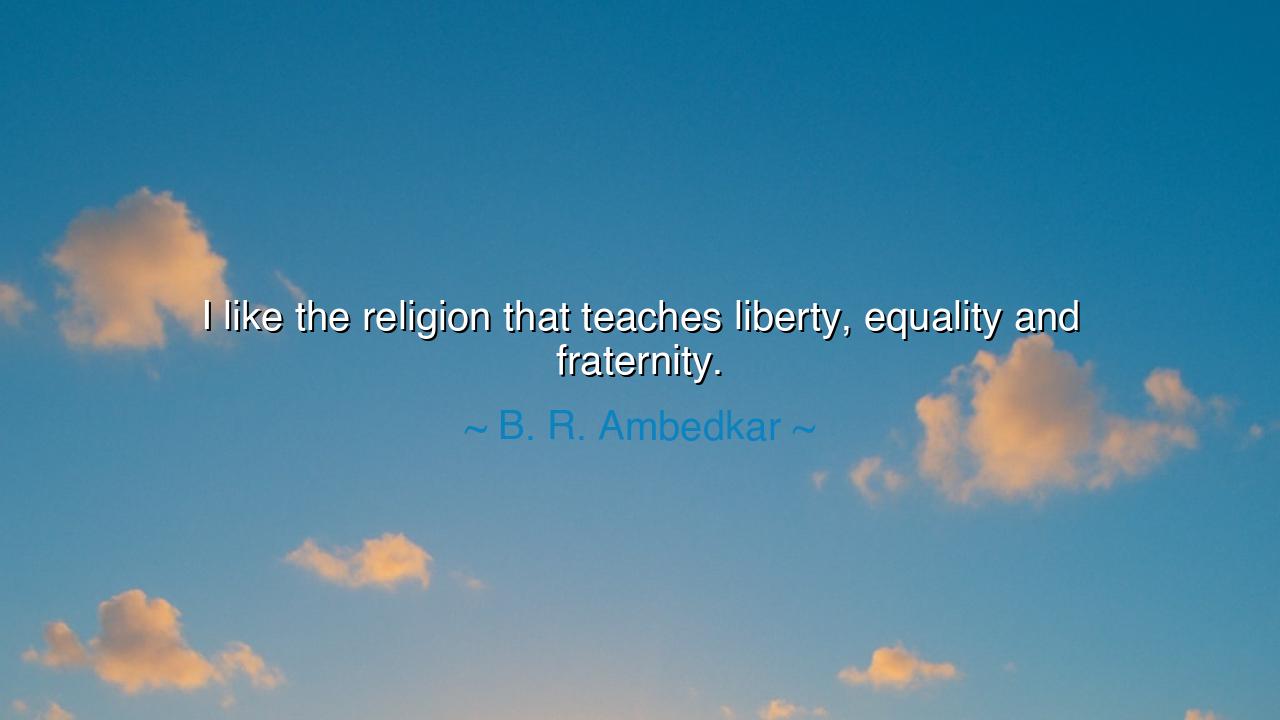
I like the religion that teaches liberty, equality and






“I like the religion that teaches liberty, equality, and fraternity.” Thus spoke B. R. Ambedkar, the architect of modern India’s Constitution and one of the most profound minds of the twentieth century. His words, simple yet mighty, rise from the depths of human struggle—from centuries of injustice, caste bondage, and social darkness. In this declaration, Ambedkar was not merely speaking of theology, but of human dignity, of the sacred duty of any faith to uplift the spirit rather than enslave it. To him, religion was not a chain of rituals or blind obedience—it was a living force meant to bring forth freedom, unity, and compassion among all people.
Ambedkar’s religion of liberty, equality, and fraternity was not confined to temples or texts—it was a moral vision of society itself. Born into the cruel reality of untouchability, he saw how faith, which should have united mankind, had instead become an instrument of division. The caste system, clothed in religious sanction, had turned brother against brother, and man against his own soul. Thus, Ambedkar sought a faith not of exclusion, but of emancipation—a religion where the lowest and the highest could stand side by side, bound not by fear or hierarchy, but by the eternal principles of justice and human worth.
In the history of thought, Ambedkar’s words shine like a beacon. For he did not reject religion itself—he redefined it. To him, a true religion was not one that demanded submission to priests or idols, but one that taught men and women to live with dignity. The trinity he invokes—liberty, equality, and fraternity—was no foreign invention, but the very essence of what he sought for all humanity. These were not just political ideals borrowed from revolution; they were spiritual truths rooted in compassion. For without liberty, the soul is caged; without equality, love is poisoned; and without fraternity, even liberty becomes cold and barren.
Consider his life’s journey, and the magnitude of this realization becomes clear. As a child, Ambedkar was forced to sit apart in school, forbidden to drink water from the same vessel as others. Yet he rose to become one of the most learned men of his age—a scholar who studied law and philosophy in Columbia and London, who returned not to seek comfort, but to liberate his people. His conversion to Buddhism in 1956 was the flowering of his lifelong quest for a religion of freedom. In the teachings of the Buddha, he found the living embodiment of his three ideals: liberty of thought, equality of all beings, and fraternity through compassion. He embraced it not as rebellion, but as redemption.
Through his quote, Ambedkar gives voice to a truth known to the sages of all ages: that religion without justice is tyranny, and faith without compassion is hypocrisy. The ancient Vedic seers, the prophets of Israel, the saints of Christendom, and the Enlightened One himself all proclaimed that the divine dwells not in walls or idols, but in the fellowship of human hearts. To follow a true religion, therefore, is to labor for the freedom and unity of all beings. It is to see in every person the same sacred flame that burns within oneself.
Yet Ambedkar’s words also bear a warning—a challenge to each generation. For too often, religion becomes a fortress of pride instead of a bridge of understanding. When faith begins to divide instead of unite, when it demands obedience instead of offering enlightenment, it ceases to serve its divine purpose. Ambedkar calls us to return to the spirit of religion, to the heart of all moral teaching: that no man or woman is born above another, and that every soul deserves both respect and opportunity. Only when faith bows before humanity—not humanity before faith—can it be said to teach liberty, equality, and fraternity.
So, my listener, take these words not as history, but as living counsel. If you would be religious, let your religion be love. If you would serve the divine, serve your fellow beings in freedom and fairness. Let your prayers rise not from ritual alone, but from deeds of compassion. Speak truth even when it offends, lift those who are bowed, and build a world where none are untouchable. For the highest temple is not built of stone, but of hearts that live by justice.
Thus did B. R. Ambedkar remind humanity that true religion does not dwell in the heavens, but in the soul of the just. A faith that teaches liberty grants the soul its wings; a faith that teaches equality restores our shared humanity; and a faith that teaches fraternity binds the broken pieces of the world into one. When these three dwell together, man walks no longer as servant or master, but as brother, as sister, as child of the eternal. This is the religion worthy of humankind—and the only one that can save it.






AAdministratorAdministrator
Welcome, honored guests. Please leave a comment, we will respond soon